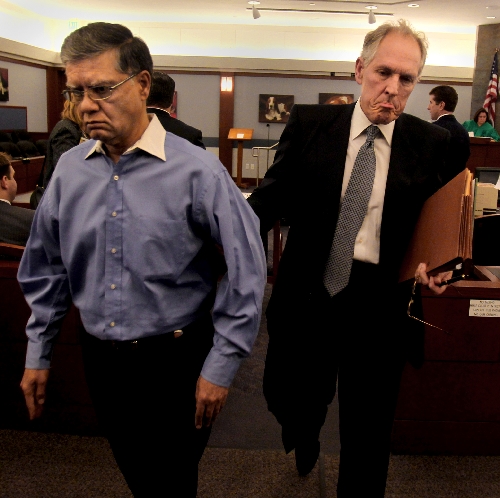Desai in court to begin appeal of competency decision

Fresh off a six-month stint in Sparks, where state medical experts found him competent to stand trial for his role in the hepatitis C outbreak, Dr. Dipak Desai appeared before a District Court judge Tuesday.
Desai’s behavior, now routine at all of his court appearances, remained unchanged at the hearing: He was guided into the courtroom by his wife and defense attorneys; he sat at the defendant’s table; he stared straight ahead and either ignored or appeared to be oblivious to the legal arguments in his case.
Prosecutors have said Desai’s behavior is an act, and experts from Lake’s Crossing, the state’s maximum security mental health facility, concluded he has been exaggerating the physical impairments caused by two strokes.
But defense attorney Richard Wright told Judge Kathleen Delaney he thinks Desai is not competent to stand trial and wants his own experts to review the conclusions of the state’s experts.
This latest legal challenge is expected to delay the March 12 criminal trial against Desai and two of his nurse anesthetists, Keith Mathahs and Ronald Lakeman. They face multiple felony charges, including racketeering, insurance fraud and neglect of patients.
Delaney said she wants to move the competency challenge along quickly but acknowledged it would take a month just to get the paperwork from Lake’s Crossing to Wright.
Once Wright receives the paperwork, which was described as “voluminous,” multiple defense experts will review the documents, and a competency hearing will be scheduled.
The competency hearing is expected to include testimony from state and defense medical experts.
Delaney is expected to schedule a competency hearing date at a Nov. 15 hearing.
Legally, there are two tests for a defendant’s competency. First the defendant must understand the charges against him and the ongoing legal proceedings. Second, the defendant must be able to assist his council in his defense.
Wright acknowledged Tuesday that Desai “knows what a court is and knows who we (the lawyers) are,” negating the first test.
Wright said he believes Desai, who voluntarily surrendered his license to practice medicine in Nevada, won’t be able to aid his lawyers in his defense because “he does not have the cognitive ability to factually understand the evidence … (including) tens of thousands of pages of testimony and interviews.”
The charges against Desai and his co-defendants revolve around seven people who authorities say were infected with the potentially deadly hepatitis C virus at Desai’s endoscopy clinics.
Authorities say Desai’s penny-pinching policy of reusing syringes that contaminated vials of medicine used on multiple patients spread the infection to the seven victims and led to tens of thousands of other patients being tested for the liver disease.
Desai, 61, remains free on $1 million bail.
And as his criminal case sputters along, Clark County civil jurors have handed down three multimillion-dollar verdicts against the drug companies that made and sold vials of the sedative propofol, which was linked to spreading the virus at Desai’s clinics.
Jurors have decided the drug companies didn’t do enough to prevent their product from being misused and have returned awards of $505 million,
$182 million and at least $14 million to victims in the three cases. Other civil trials related to the hepatitis C outbreak are set to start.
The verdicts are either under appeal or will be appealed.
Desai also faces federal criminal charges.
He is set to face trial May 22 with Tonya Rushing, his clinic manager, on one count of conspiracy and 25 counts of health care fraud.
An indictment alleged the pair carried out a scheme from January 2005 through February 2008 to inflate the length of medical procedures and overbill health insurance companies. Desai has yet to enter a plea in the federal case.
Contact reporter Francis McCabe at fmccabe@reviewjournal.com or 702-380-1039.












